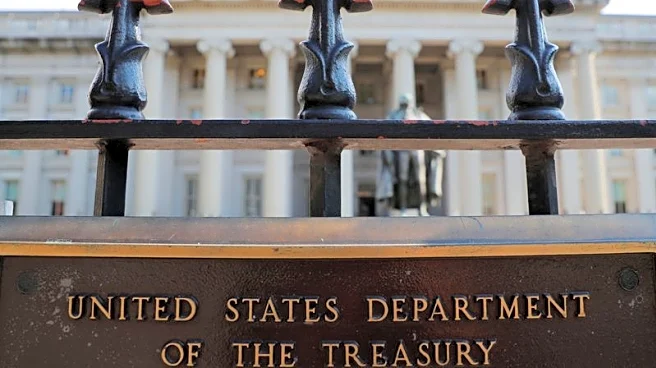What's Happening?
The U.S. Senate has taken steps to advance a funding deal aimed at ending a 40-day government shutdown. This shutdown has significantly affected federal workers, delayed food aid, and disrupted air travel. The Senate's move provides hope for a resolution,
potentially restoring normal operations for various government services. Meanwhile, China's economic data shows a contraction in exports and a rise in consumer inflation, which has left investors uncertain about future monetary policy actions. The People's Bank of China (PBOC) is expected to ease monetary policy before the year-end, with potential interest rate reductions and cuts to banks' reserve requirement ratios.
Why It's Important?
The prolonged government shutdown has had widespread implications, affecting federal employees and essential services across the U.S. The Senate's action to end the shutdown could alleviate these disruptions, allowing federal workers to return to their jobs and restoring critical services. Additionally, the economic developments in China, including export contractions and inflation changes, could influence global markets and trade relations. The PBOC's anticipated monetary policy adjustments may impact international economic dynamics, particularly in relation to U.S.-China trade and financial interactions.
What's Next?
If the Senate successfully passes the funding deal, federal operations could resume, providing relief to affected workers and services. The resolution of the shutdown may also stabilize domestic markets and improve public sentiment. In China, upcoming credit data and economic indicators, such as retail sales, are expected to provide further insights into the country's economic health. These developments may guide future monetary policy decisions by the PBOC, potentially affecting global economic trends and U.S.-China relations.
Beyond the Headlines
The government shutdown highlights the vulnerability of federal operations to political impasses, underscoring the need for more resilient funding mechanisms. The situation also raises ethical concerns about the impact on federal employees and the provision of essential services. In China, the economic slowdown and inflation changes may prompt long-term shifts in monetary policy, influencing global trade and investment strategies.
















